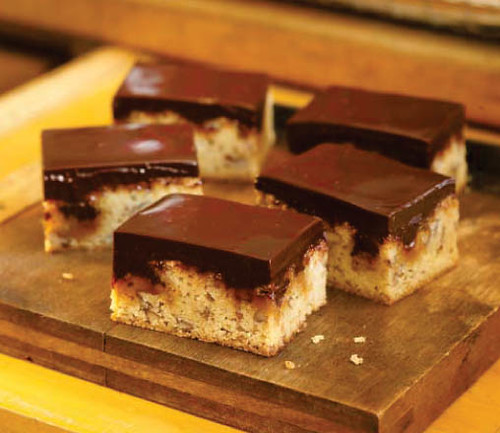
The Brown(ie) Noser: photo from Cookie Swap by Julia M. Usher used with permission.
As promised in the interview with Julia M. Usher, author of Cookie Swap: Creative Treats to Share Throughout the Year (which you can win here!), here's a recipe for decadent butterscotch brownies with caramel and ganache on top!
(which you can win here!), here's a recipe for decadent butterscotch brownies with caramel and ganache on top!
Caramel Topping
- 8 ounces caramel candies (about 27 cubes)
- ¼ cup heavy cream
- 1 tablespoon unsalted butter
- 4½ teaspoons all-purpose flour
- ½ teaspoon pure vanilla extract
Butterscotch Brownies
- 16 ounces premium semisweet chocolate
- finely chopped or ground in a food processor
- 1½ cups heavy cream
- 1 tablespoon light corn syrup
- Make the Caramel Topping. Unwrap the caramel candies and combine with the cream and butter in a small nonreactive (stainless steel or coated) saucepan. Place over medium heat and cook, stirring regularly to prevent scorching, until the caramels and butter are completely melted and the mixture has boiled. Remove from the heat. Stir in the flour, mixing well to break apart any lumps. Add the vanilla extract and set the topping in a warm place so the caramel stays fluid while you prepare the brownie batter.
- Position a rack in the center of the oven and preheat the oven to 350 degrees F. Line a 10 x 15 x 2-inch glass baking dish (sometimes called a roasting pan, p. 10) with foil, leaving a 1-inch overhang around the top edge of the pan. Smooth out any big wrinkles in the foil and then lightly coat the foil with nonstick cooking spray.
- Mix the Butterscotch Brownies. Combine the flour, baking powder, and salt together in a medium bowl. Set aside.
- Place the butter in a medium (3-quart) saucepan over low heat. Once the butter has fully melted, remove it from the heat and stir in the brown sugar, mixing until smooth. (Note: Don’t be surprised if the butter and sugar do not completely come together at this point; some separation is normal.) Cool a few minutes; then add the eggs one at a time, whisking well after each addition. Add the vanilla extract and rum, if desired. Gradually add the flour mixture, whisking all the while to keep the batter lump free. Stir in the pecans. Turn the batter into the prepared pan and level with a small offset spatula. (The batter will be less than 1 inch thick, but it will bake to about twice its original thickness.)
- Drizzle the caramel topping evenly over the batter. (If the caramel has thickened and is difficult to drizzle, gently reheat it.) Marble the top (and break apart any large caramel blobs) by drawing a spatula through both the topping and the batter in a random pattern.
- Bake until a cake tester inserted into the center comes out with moist crumbs on it, and the brownie has pulled away from the edges of the pan, about 35 to 40 minutes. Transfer to a wire rack and cool completely in the pan. (Areas that had larger helpings of caramel topping may sink slightly, but don’t worry; the ganache will completely cover any holes.)
- Prepare and apply the Ganache Glaze (optional). Make the glaze only after the brownies have completely cooled. Follow the instructions for Ganache (below).
- While the ganache is fluid, pour it evenly over the brownie. Gently tilt or shake the pan so that the ganache completely coats the brownie top. Cover with foil, taking care to keep it from touching the ganache. Refrigerate 3 to 4 hours, or until the ganache is firm enough to cut cleanly.
- Remove the brownies from the pan in one block by gently pulling up on the foil overhang. Place directly on a cutting board. Remove all foil, and trim any uneven edges before cutting into 1½-inch squares. For the neatest cuts, slice the bars while the ganache is firm and wipe the knife clean with a warm, damp cloth between slices. Serve at room temperature.
Ganache Directions:
- Place the chopped (or ground) chocolate in a large bowl so it
- forms a shallow layer. Set aside.
- Pour the cream into a medium (3-quart) nonreactive (stainless steel or coated) saucepan. Place over medium to medium-high heat and scald the cream. (That is, heat the cream to just below the boiling point. The cream will put off steam, but no bubbles should break on its surface.)
- Immediately strain the hot cream through a fine-meshed sieve directly onto the chocolate. Let the mixture sit 1 to 2 minutes without stirring, and then gently whisk until the chocolate is entirely melted. (If the chocolate does not completely melt, set the bowl over barely simmering water in a double boiler and stir regularly until smooth. Do not overheat, or the ganache may break.) Stir in the corn syrup.
- To use the ganache as a glaze, pour it while lukewarm. Alternatively, for piping ganache, pour it into a shallow pan to a ½- to ¾-inch depth, cover, and refrigerate 20 to 25 minutes, or until slightly thickened. Stir occasionally during chilling to maintain a uniform consistency. (Hard, overchilled pieces of ganache should be broken up, as they can easily clog pastry tips when piping.) Chilling time will vary with starting ganache temperature, refrigerator temperature, and depth of the ganache. Watch the ganache closely, as it can quickly overchill and become difficult to pipe.
For more information about Julia M. Usher, visit her site, become a Facebook fan or follow her on Twitter!
